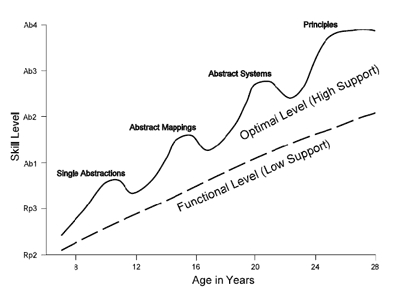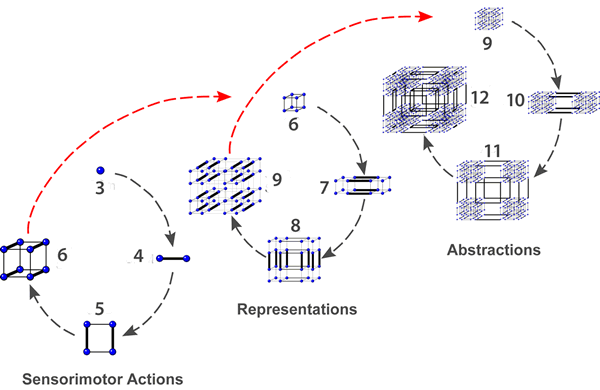Cognitive development
Jump to navigation
Jump to search
(needs to be written)
In the meantime, check other articles in the category Learning_theories
Overview
Fischer's dynamic skills
According to Fischer, 2008:132), “Cognitive development moves through ten levels between 4 months of age and early adulthood. The levels from childhood to adulthood, which are most relevant for education, are summarized in [the table below].”
| Level | Optimal (years) | Functional (years) |
|---|---|---|
| Rp1 Single Representations | 2 | 2-5 |
| Rp2 Representational Mappings | 4 | 4-8 |
| Rp3 Representational Systems | 6 | 7-12 |
| Rp4/Ab1 Single Abstractions | 10 | 12-20 |
| Ab2 Abstract Mappings | 15 | 17 to 30 |
| Ab3 Abstract Systems | 20 | 23-40, or never for many domains |
| Ab4/P Single Principles | 25 | 30-45, or never for many domains |
Spurts and drops in performance that occur for optimal performance at specific ages
“Three adult levels (levels 10, 11, and 12) correspond to the abstract mappings (10), abstract systems (11), and single principles (12) levels of Fischer’s (1980 and 2006) dynamic skill scale” (Dawson and Heikkinen, 2009)
Fischers skill levels can be mapped to other work.
Links
- Wikipedia links
- Introductions
- What's the brain got to do with it? (Harward, Graduate School of Education)
- How education can change the brain (Harward, Graduate School of Education)
Bibliography
- Theo Dawson and Katie Heikkinen (2009). Identifying within-level differences in leadership decision making, Integral Leadership Review, Volume IX, No. 5 - October 2009. HTML
- Fischer, Kurt W. and Samuel P. Rose (1998). Growth Cycles of Brain and Mind, Educational Leadership (How the Brain Learns), Volume 56 | Number 3, Pages 56-60
- Fischer, K. W., & Bidell, T. R. (1997). Dynamic development of psychological structures in action and thought. In R. M. Lerner (Ed.) & W. Damon (Series Ed.), Handbook of child psychology: Vol 1. Theoretical models of human development (5th ed., pp. 467–561). New York: Wiley.
- S. Morra, C. Gobbo, Z. Marini, and R. Sheese, Cognitive Development: Neo-piagetian Perspectives. Psychology Press, 2007.
- van Geert, P. (in press). A dynamic systems model of basic developmental mechanisms: Piaget, Vygotsky, and beyond. Psychological Review.


